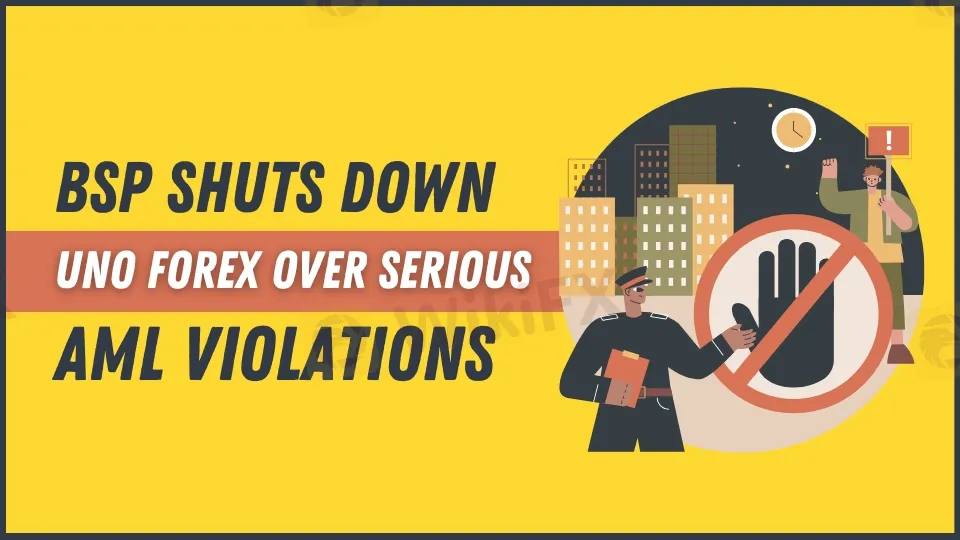简体中文
繁體中文
English
Pусский
日本語
ภาษาไทย
Tiếng Việt
Bahasa Indonesia
Español
हिन्दी
Filippiiniläinen
Français
Deutsch
Português
Türkçe
한국어
العربية
BSP Shuts Down Uno Forex Over Serious AML Violations
Abstract:BSP cancels Uno Forex’s Inc. registration, marking its fifth shutdown this year over failure to comply with anti-money laundering laws, raising concerns.

In a troubling move for the financial sector, the Bangko Sentral ng Pilipinas (BSP) has canceled the registration of Uno Forex Inc., yet another foreign exchange dealer found guilty of severe violations of anti-money laundering regulations. This decision underscores the increasing pattern of negligence among firms in the industry, with Uno Forex becoming the fifth company to be blocked from operating this year alone.
The BSPs Monetary Board cited “serious violations” of the Manual of Regulations for Non-Bank Financial Institutions and the Anti-Money Laundering Act of 2001, emphasizing that these breaches are not minor infractions but represent a significant failure to uphold the law. The latest shutdown follows a disturbing trend of non-compliance by money changers and foreign exchange dealers, leaving questions about how these firms were allowed to operate unchecked for so long.

Earlier in the year, the BSP revoked the registration of Foreignex Inc. and Nikko Foreign Exchange, both for similar anti-money laundering offenses.
In fact, this pattern of regulatory failure seems all too common, with Nikko Mart and Atomtrans Tech Corp. also losing their licenses for serious non-compliance. The fact that five firms have now been shut down in 2024 alone raises serious concerns about the effectiveness of the BSPs oversight.
While the BSP argues that its actions are meant to preserve the integrity of the financial system, it begs the question: how did these companies manage to operate for so long without facing any consequences? With lax enforcement and repeated violations by multiple institutions, the central banks regulatory framework seems to be failing in its core responsibility—preventing illegal activities within the financial sector.
The BSPs cancellation of Uno Forex's registration is a reminder that the financial system in the Philippines is still vulnerable to criminal misuse, and much more stringent oversight is needed to prevent further damage.
Final Thoughts
The BSPs repeated shutdowns of firms due to non-compliance with anti-money laundering regulations highlight a disturbing pattern of regulatory failure. If the central bank is serious about its mission to protect the financial system, it must take stronger, more proactive measures to ensure compliance before the damage is done, rather than cleaning up after the fact.

Disclaimer:
The views in this article only represent the author's personal views, and do not constitute investment advice on this platform. This platform does not guarantee the accuracy, completeness and timeliness of the information in the article, and will not be liable for any loss caused by the use of or reliance on the information in the article.
Read more

SEC Ends Crypto.com Probe, No Action Taken by Regulator
The SEC has closed its investigation into Crypto.com with no action taken. Crypto.com celebrates regulatory clarity and renewed momentum for the crypto industry.

Bitpanda Secures Full Broker-Dealer License in Dubai
Bitpanda has officially obtained a full broker-dealer license from the Dubai Virtual Assets Regulatory Authority (VARA), marking a significant milestone in its international expansion. This approval, which follows preliminary authorization granted three months earlier, enables the European digital asset exchange to introduce its comprehensive suite of virtual asset services to investors in the United Arab Emirates (UAE).

Interactive Brokers Expands Crypto Trading with Solana, XRP, Cardano, and Dogecoin
Interactive Brokers adds Solana, XRP, Cardano, and Dogecoin to its platform, enabling U.S. and U.K. clients to trade crypto 24/7 with low fees.

Gold Surges to New Highs – Is It Time to Buy?
Recently, gold prices have once again set new records, surpassing $3,077 per ounce and continuing a four-week winning streak. Is It the Right Time to Invest?
WikiFX Broker
Latest News
Enlighten Securities Penalized $5 Million as SFC Uncovers Risk Control Failures
Why Are Financial Firms Adopting Stablecoins to Enhance Services and Stability?
Experienced Forex Traders Usually Do This Before Making a Lot of Money
Octa vs XM:Face-Off: A Detailed Comparison
When High Returns Go Wrong: How a Finance Manager Lost RM364,000
Bridging Trust, Exploring Best—WikiEXPO Hong Kong 2025 Wraps Up Spectacularly
Interactive Brokers Expands Crypto Trading with Solana, XRP, Cardano, and Dogecoin
Fidelity Investments Explores Stablecoin Innovation in Digital Assets Sector
Why More People Are Trading Online Today?
SEC Ends Crypto.com Probe, No Action Taken by Regulator
Currency Calculator







